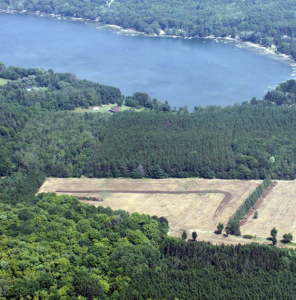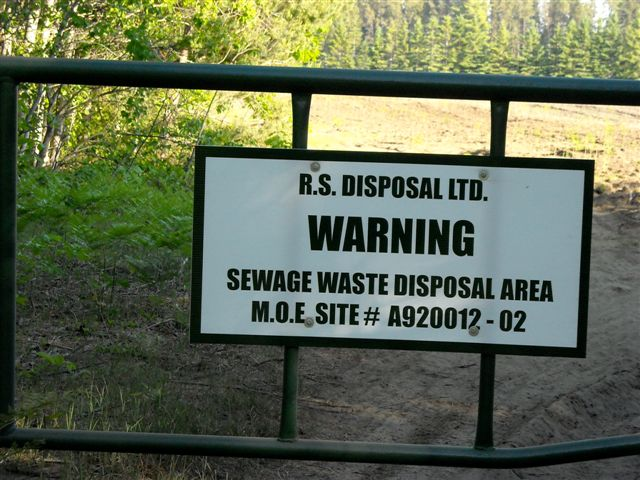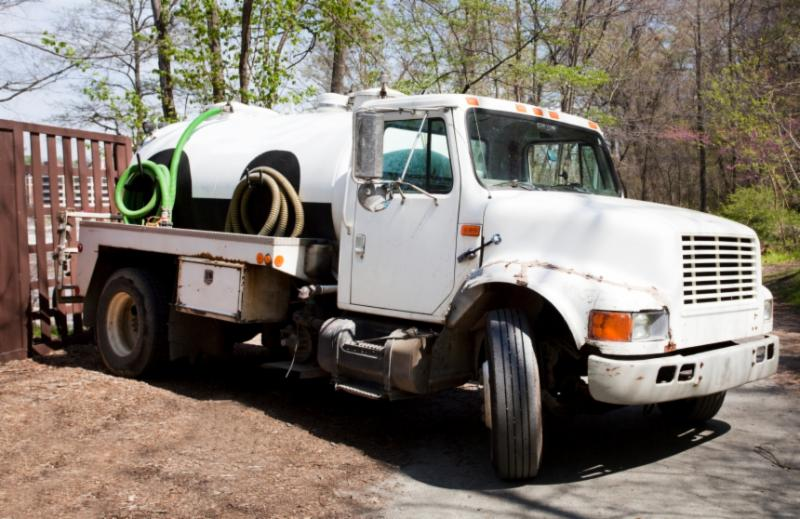
Septage Management Issues
In 2010, the Ministry of the Environment (MOE) approved a site about 16 acres in size for the spreading of raw untreated sewage approximately 390 metres from Farlain Lake. The photo below shows the location of what is known as the Awenda site near the south end of the lake.
The FLCA has had concerns as to the impact of this site on the community and particularly on the lake. Our association wants to stop the spreading of raw sewage at the Awenda site as soon as possible, and more generally, supports an environmentally responsible way to manage waste.
Checks and Balances
The Ministry of the Environment imposes standards and conditions on the transport and land application of septage through the Certificate of Approval process. To be approved as septage field, Regional Sanitation Disposal had to apply for a Certificate of Approval from MOE. The MOE District Office assessed the information (i.e. soil type, slope of land, setback distances, etc.) contained in the application and conducted a pre-approval site visit to confirm all submitted documentation was correct. In addition to evaluating the site, MOE required the septage hauler to undertake a hydrogeological study of site before the Provisional Certficate of Approval was issued.


A number of septage application restrictions were set out in the Certificate of Approval. Some of these operating conditions for the Awenda septage field include:
- Application rate of 10 litres per square metre per 7 day period.
- Septage can not be applied to the site when heavy rainfall is threatening or occurring, or when the soil is saturated at the surface.
- Septage can not be spread after November 30th or prior to April 1st of any year. Septage can not be spread on frozen, ice covered or snow covered soil.
Groundwater will be monitored twice a year for nitrate, nitrite, TKN (total Kjehldahl nitrogen), ammonia, and phosphorous.
Current Situation
Septage continues to be an issue of concern in our community. Concern about seepage into the lake, or our aquifers, along with the smell and other health related issues requires the dumping of untreated sewage on the field adjacent the lake to stop. The spreading of untreated sewage on land has been a topic of discussion at the Provincial and Municipal level for many years and the consensus is that it should be stopped but no new policies have been implemented to address this health and environmental issue. The FLCA has been monitoring the situation and discussing our concerns with both levels of government. Our position has always been to find an environmentally acceptable solution that would stop the dumping in our community as quickly as possible.
Tiny Township
Tiny Township did considerable work in the past on this matter including environmental studies and identifying viable solutions including a “made in Tiny solution” as well as a shared solution with adjacent municipalities. That worked stopped a couple of years back as it was felt inappropriate to commit substantial funds to a solution if haulers could bypass our facility once built in favour of other dumping options. The facility was to be funded based on fees generated over time from haulers which was in doubt without regulation to force the use of such facilities. So Tiny decided to focus on a lobbying effort with the Provincial government to get regulations changed before committing to such a costly endeavor.
Tiny has been participating in the Hauled Sewage Policy and Program Review Working Group formed by the MOECC to deal with this issue at a provincial level. Discussions by the working group included:
Using a phased in implementation for banning the spreading of sewage on lands,
The relationship between municipal zoning by-laws and provincial authority to license the spreading of untreated sewage on lands. If zoning prohibitions impact the ability to issue land use licenses, Tiny may have an ability to stop the spreading within the community as Tiny’s Zoning By-Laws do not permit the spreading of untreated hauled sewage in any zone.
Tiny Township is also asking the Ministry why municipalities are not provided an opportunity to comment on land applications of untreated sewage to confirm if zoning of the property permits that use.
The financial implications to municipalities are the biggest hurdle. It is really important that the MOECC assist in facilitating partnerships between municipalities as well as encouraging public-private partnerships to take some of the financial burden off municipalities for both the initial capital investment and ongoing operational costs.
Unfortunately there is no further progress on identifying a solution and so the spreading on the Awenda site continues. To date, there does not appear to be any impact on the quality of water in the lake.
